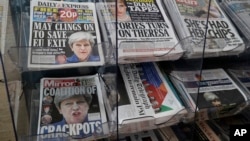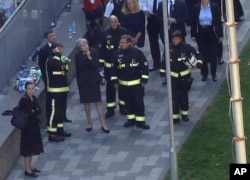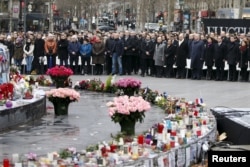How national leaders respond to a crisis, man-made or natural, can make or break their time in office, and even curtail it, if they get it awfully wrong. Aside from showing determination to correct what went wrong or repairing the damage, did they connect and channel a nation’s grief acting as an inspiring mourner-in-chief?
That question is being asked now of British Prime Minister Theresa May as she faces public fury over her response to a devastating fire last week in London that engulfed an apartment tower, leaving at least 59 dead, dozens missing and hundreds of people homeless.
Staggering from terrorist attacks to a man-made disaster and on Monday back to another terror attack, May has appeared all too often, according to critics, aloof and unfeeling. She is widely dubbed as "Maybot" for her programmed and often perfunctory responses and her initial failure to visit victims and survivors of the terror attack and tower block fire has prompted fury.
The charge she is unfeeling is vehemently denied by her aides as unfair, but even the country’s Conservative tabloid press has turned critical. Tory columnist Simon Heffer damned her for “her robotic and sequestered performance” and for her “complete failure to connect with the public.”
Fair or not, national leaders across the Western world have little room for error these days in how they respond to outrages and catastrophe, faced as they are by suspicious, disgruntled publics that have scant faith in established politicians and are ready to heed populists offering simple and sometimes punitive solutions.
Europe’s leaders are being tested, and how they cope with the aftermath of disaster is either helping them to tamp down populist anger, channel it or be consumed by it, say analysts.
Declining caliber
Last week, the Economist magazine lamented the declining caliber of the country’s leaders on both sides of the political spectrum, arguing, “Today it is as if Britain’s various elites have all decided, at exactly the same time, to stop sending their best people to Parliament.”
Part of the problem, the magazine suggested, is that while in the past the ranks of the politicians were full of people who had wide experience of life before entering politics, they have been replaced by “professionals who make their livelihood out of politics.” The same could be said of Britain’s European neighbors.
May isn't alone as a national leader flailing to get ahead of a crisis. France’s former president, Francois Hollande, left office with historically low poll ratings, and the worst score of any French leader since such surveys were first conducted more than three decades ago.
During the 2015 terror attacks in Paris targeting the staff of satirical magazine Charlie Hebdo, a Jewish supermarket, and later a concert hall and restaurants his popularity briefly rose above 30 percent, receiving praise for his reaction. But the bump was short-lived as more terrorist attacks rattled the country.
Little room for maneuver
Often a common touch is all that is needed to ensure a leader comes out of a crisis unscathed. Italy’s Matteo Renzi received plaudits for his reaction to devastating earthquakes in central Italy in 2016 that left nearly 300 people dead. Then prime minister, Renzi moved quickly to order a national plan to try to improve building standards and was quick to visit the stricken zone, embracing an exhausted fireman and sympathizing with survivors and relatives of those killed.
Italy’s La Stampa newspaper noted at the time, “Renzi has understood more than anyone that this earthquake involves him and exposes him personally. The quake calls for a strong demonstration of leadership.”
The media broadly praised Renzi’s talents as a skilled communicator with his emotional intelligence and words that connected.
With the rise of populist, often extremist, political parties and movements threatening Europe’s established parties, leaders have little room for maneuver. With ever-quickening news cycles, the hours immediately following a terror attack or a disaster are crucial - connecting with the public, issuing calming statements, channeling grief are as key as managing behind-the-scenes.
May appears to have heeded the criticism. In the aftermath of the Westminster Bridge attack in March, there was no word from her for six hours. But Monday she issued a statement within four hours of a van attack that deliberately targeted Muslims, speaking to the country on television, and visiting the Finsbury Park mosque to meet with faith leaders.






